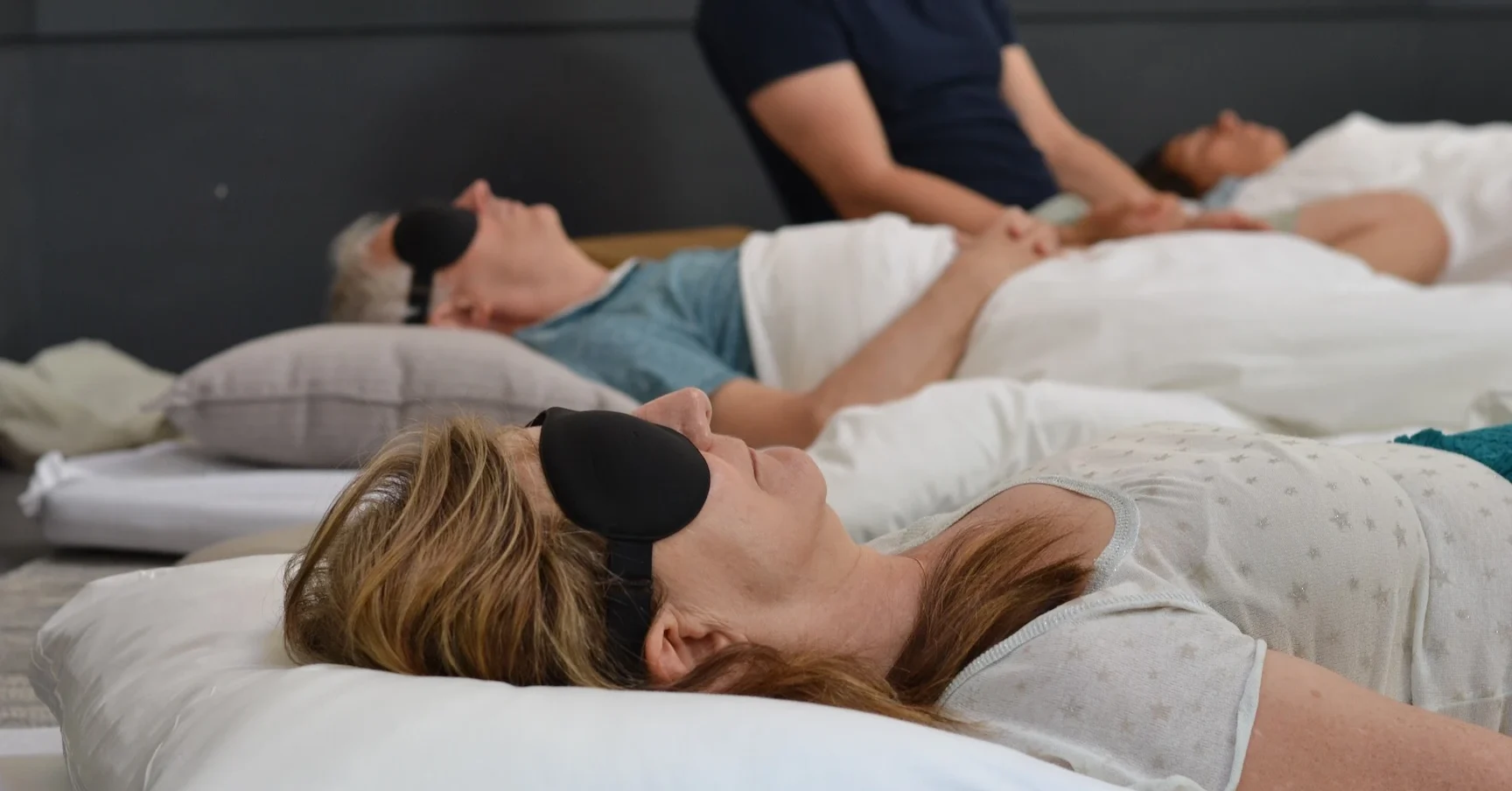Francisca Niklitschek
Contributing Authors
Dmitrij Achelrod PhD
Francisca Niklitschek
The Importance of Set and Setting
in Psychedelic Experiences
“Set and setting”, these two seemingly simple words hold the key to unlocking the full potential of psychedelic experiences or, when neglected, they can pave the way for confusion, overwhelm, and even harm. While much attention is often given to the psychedelic substance itself, decades of research and countless personal accounts remind us: it’s not just what you take, but the mindset and environment you bring to the experience that truly shape it.
At Evolute Institute, we have previously emphasized the critical role of integration in transforming psychedelic insights into lasting life changes. If you haven’t yet explored our blog on the importance of integration, we invite you to dive into that next. Integration is essential, but so is the quality of the experience you’re integrating. This is where set and setting come into focus as not just peripheral details, but as the very architecture of a safe, meaningful, and potentially life-changing journey.
In this blog, we explore why set and setting are not just supportive elements – they are the amplifiers, the context-makers, and sometimes, the difference between profound insight and a disorienting ride. Let’s dive in.
What Is “Set and Setting” in Psychedelic Experiences?
The concept of set and setting was popularized by psychedelic researchers like Timothy Leary [1] and has since been validated by decades of clinical research. It refers to the two key contextual factors that shape the quality and outcome of a psychedelic experience.
- Set: Refers to the psychological mindset, emotional readiness, intentions, expectations, and personal history that the individual brings into the experience. It’s the emotional “terrain” you carry with you.
- Setting: Encompasses the physical surroundings, the social environment, the presence (or absence) of supportive guides, and the energetic tone of the space where the experience unfolds.

Together, set and setting profoundly influence whether the experience will be insightful, challenging, or even overwhelming. Clinical studies and retreat-based practices consistently show that supportive settings and well-prepared participants are critical to maximizing therapeutic benefits and minimizing risks [2], [3].
Further studies demonstrate that [4] [5] [6]:
- Supportive settings significantly reduce the likelihood of adverse reactions, including panic, paranoia, or psychological distress.
- Positive therapeutic outcomes are strongly correlated with the participant’s trust in the environment and the facilitators.
- Challenging experiences, when properly supported, often become the most meaningful and healing moments in psychedelic therapy.
In essence, set and setting do not just influence the experience, they co-create it.
Why Set Matters: Preparing the Mind for a Psychedelic Journey
You are stepping into an experience that can radically alter your perception of reality: your thoughts, your perception, even your sense of self. In such a vulnerable state, the quality of your internal world becomes not just relevant but essential.
Your internal landscape: the beliefs, fears, emotional readiness, and intentions you bring, plays a powerful role in shaping the psychedelic experience [3], [7].
Key Aspects of “Set”
- Emotional Readiness: Entering the experience with openness rather than resistance can lead to deeper emotional breakthroughs [3]. Small actions like journaling honestly, expressing emotions freely, or having vulnerable conversations with a trusted friend can gently open the heart and prepare the mind to welcome whatever arises.
- Intention Setting: While psychedelics can lead to surprising and spontaneous insights, intentions act as inner compasses. Setting an honest intention helps orient the experience, especially in moments that feel overwhelming or confusing. Research shows that participants with clear intentions often report more meaningful and integrative outcomes [8].
A simple, grounded intention – such as writing down “I am here to understand myself” or quietly holding a question like “What do I need to heal?” – can serve as a subtle but steady guide throughout the journey.
- Psychological Preparation: Understanding potential challenges, including difficult emotional content, increases the capacity to stay present and engaged [9].
Practices like reading about others’ experiences, learning breathing techniques, or reminding yourself that difficult moments are temporary can build resilience and support you when intensity arises.
Research emphasizes that participants with clear intentions and adequate psychological support tend to experience more positive and enduring outcomes [10].

At Evolute Institute, we believe that preparation is not optional, it is a form of care. That’s why we offer:
- Structured preparation programs including intention-setting workshops, psychological assessments, and one-on-one coaching.
- Mindfulness practices and embodiment exercises that cultivate presence and emotional resilience.
- Educational resources that demystify the psychedelic process and promote realistic expectations.
This comprehensive preparation builds a mental and emotional foundation for a safe journey, and when the mind is prepared, it is not just receptive, it is empowered.
Why Setting Matters: Crafting a Safe and Trustworthy Space
If the set is the internal compass, the setting is the terrain where the journey takes place. The physical and relational space profoundly influences whether participants can fully surrender and explore the depths of their experience [3], [7], [11].
Key Aspects of “Setting”
- Physical Safety: Comfortable, quiet, nature-based and aesthetically pleasing spaces reduce anxiety and promote relaxation [11].
- Emotional Safety: Supportive, non-judgmental guides and participant groups create the trust required for participants to fully surrender to the experience. Knowing that facilitators are experienced, compassionate, and attentive enables deep emotional work [2].
- Relational Support: A well-crafted group dynamic can offer profound benefits. Feeling seen, heard, and gently accompanied by both facilitators and peers can deepen trust, reduce fear, and encourage emotional openness [2].
Studies in clinical and naturalistic settings consistently highlight that the quality of the setting can mitigate challenging experiences and enhance therapeutic outcomes [12] [13].
For example, being in a thoughtfully prepared space – where everything has been arranged to promote comfort, ease, and trust – can make a profound difference. When participants know that the environment has been intentionally designed for their care, with attention to their physical, emotional, and psychological needs, it becomes much easier to relax, feel held, and fully engage with the journey.
At Evolute Institute, we intentionally craft:
- Beautiful, natural retreat spaces that encourage calm and introspection.
- Small group settings that foster community connection while honoring individual journeys.
- Trained, trauma-informed facilitators who provide personalized, compassionate support throughout the entire process.
- A non-clinical, yet highly professional environment that balances structure with authentic human care.
Our EvoSHIFT psychedelic retreat, is designed exactly for this: small, intimate groups, carefully chosen spaces, and facilitators who walk with you from beginning to end. It’s not just a retreat; it’s a safe container for your unfolding process.

What Happens When Set and Setting Are Ignored?
When set and setting are overlooked, even potentially healing substances like psilocybin can lead to:
- Overwhelming anxiety or overwhelming scenarios [3].
- Traumatizing experiences without support [11].
- Difficulty integrating insights post-experience [2].
- Increased likelihood of “bad trips” with lasting psychological discomfort [11].
For example, someone might casually agree to trip-sit a friend, only to feel completely overwhelmed when their friend begins to cry uncontrollably, realizing too late that they have no tools or emotional readiness to offer real support.
In another scenario, a person might take psilocybin at a loud party, surrounded by people they don’t fully trust. As the substance takes effect, the overstimulating environment amplifies feelings of paranoia and confusion, quickly spiraling into a terrifying experience.
Or, someone may embark on a solo journey without any kind of preparation. They encounter profound emotional material but, afterward, feel lost and destabilized, unable to process what surfaced, and without a safe container to help make sense of it.
Many adverse events reported in uncontrolled, recreational settings are not due to the psychedelic substance itself but rather to a lack of preparation, emotional safety, and proper containment. This is why professional, intentional spaces like those created by Evolute Institute are essential for anyone seeking depth and safety in their psychedelic work.
Set, Setting, and Integration: The Full Arc of Transformation
It’s not enough to carefully prepare the mind (set) and meticulously craft the environment (setting) if we neglect what happens after the experience.
Integration is the bridge that carries insights from the psychedelic realm into sustainable life change.
Without integration:
- Insights may fade or become confusing
- Emotional breakthroughs may not translate into life changes
- Psychological challenges may remain unresolved
At Evolute Institute, we prioritize:
- Multi-week integration programs
- Personal and group reflection sessions
- Coaching and embodiment practices that help participants ground their insights in daily life.
We believe that the arc of transformation includes every stage: preparation, journey, and integration. Each part holds equal weight. Each part is necessary.
Conclusions
Psychedelic experiences hold immense potential for growth, and self-discovery, but that potential is never unlocked in isolation. The preparation of the mind (set) and the careful curation of the environment (setting) are inseparable from the medicine itself. They shape the pathways through which the experience unfolds, whether as a gateway to deep insight or a source of emotional turbulence.
At Evolute Institute, we’ve seen time and again how the interplay of set, setting, and integration forms the complete arc of transformation. Without thoughtful preparation and a safe container, even the most promising journeys can falter. Without integration, even the most beautiful insights can fade.
To truly honor psychedelic journeys, we must hold them from beginning to end, with curiosity, with care, and with deep respect for the spaces we create inside and out.

Ultimately, set and setting are not just checklists. They are an invitation to step into intentionality, to build trust in ourselves and those who hold us, and to embrace the profound possibility that – when properly supported – psychedelic experiences can be some of the most meaningful of our lives.
If you feel called to explore this path, EvoSHIFT offers a powerful container where the principles of set, setting, and integration are fully embodied.
Bibliography
[1] ‘Set and setting’, Wikipedia. May 25, 2025. Accessed: Jun. 19, 2025. [Online]. Available: https://en.wikipedia.org/w/index.php?title=Set_and_setting&oldid=1292086403
[2] T. Noorani, ‘Containment matters: Set and setting in contemporary psychedelic psychiatry’, Philos. Psychiatry Psychol., vol. 28, no. 3, pp. 201–216, 2021, doi: 10.1353/ppp.2021.0032.
[3] I. Hartogsohn, ‘Set and Setting for Psychedelic Harm Reduction’, Curr. Top. Behav. Neurosci., Jul. 2024, doi: 10.1007/7854_2024_509.
[4] N. Devenot, A. Seale-Feldman, E. Smith, T. Noorani, A. Garcia-Romeu, and M. W. Johnson, ‘Psychedelic Identity Shift: A Critical Approach to Set And Setting’, Kennedy Inst. Ethics J., vol. 32, no. 4, pp. 359–399, 2022, doi: 10.1353/ken.2022.0022.
[5] I. Hartogsohn, ‘Set and setting, psychedelics and the placebo response: An extra-pharmacological perspective on psychopharmacology’, J. Psychopharmacol. Oxf. Engl., vol. 30, no. 12, pp. 1259–1267, Dec. 2016, doi: 10.1177/0269881116677852.
[6] I. Hartogsohn, ‘Modalities of the psychedelic experience: Microclimates of set and setting in hallucinogen research and culture’, Transcult. Psychiatry, vol. 59, no. 5, pp. 579–591, Oct. 2022, doi: 10.1177/13634615221100385.
[7] L. F. Borkel, J. Rojas-Hernández, L. A. Henríquez-Hernández, Á. Santana Del Pino, and D. J. Quintana-Hernández, ‘Set and setting predict psychopathology, wellbeing and meaningfulness of psychedelic experiences: a correlational study’, Expert Rev. Clin. Pharmacol., vol. 17, no. 2, pp. 165–176, 2024, doi: 10.1080/17512433.2023.2295997.
[8] I. Hartogsohn, ‘Constructing drug effects: A history of set and setting’, Drug Sci. Policy Law, vol. 3, p. 2050324516683325, Jan. 2017, doi: 10.1177/2050324516683325.
[9] R. G. McAlpine, G. Blackburne, and S. K. Kamboj, ‘Development and psychometric validation of a novel scale for measuring “psychedelic preparedness”’, Sci. Rep., vol. 14, no. 1, p. 3280, Feb. 2024, doi: 10.1038/s41598-024-53829-z.
[10] ‘Psychedelics and the essential importance of context – Robin L Carhart-Harris, Leor Roseman, Eline Haijen, David Erritzoe, Rosalind Watts, Igor Branchi, Mendel Kaelen, 2018’. Accessed: Jun. 19, 2025. [Online]. Available: https://journals.sagepub.com/doi/abs/10.1177/0269881118754710
[11] T. L. Golden et al., ‘Effects of Setting on Psychedelic Experiences, Therapies, and Outcomes: A Rapid Scoping Review of the Literature’, Curr. Top. Behav. Neurosci., vol. 56, pp. 35–70, 2022, doi: 10.1007/7854_2021_298.
[12] E. C. H. M. Haijen et al., ‘Predicting Responses to Psychedelics: A Prospective Study’, Front. Pharmacol., vol. 9, Nov. 2018, doi: 10.3389/fphar.2018.00897.
[13] R. L. Carhart-Harris et al., ‘Psychedelics and the essential importance of context’, J. Psychopharmacol. Oxf. Engl., vol. 32, no. 7, pp. 725–731, Jul. 2018, doi: 10.1177/0269881118754710.
FREQUENTLY ASKED QUESTIONS (FAQ)
“Set” refers to the mental and emotional mindset you bring to the experience. “Setting” refers to the physical and social environment in which the psychedelic journey takes place. Both are essential for a safe and positive outcome.
Set and setting dramatically shape how you experience a psychedelic journey. A well-prepared mindset and a supportive environment reduce risks, foster trust, and increase the likelihood of meaningful, transformative experiences.
Without proper set and setting, individuals are more likely to have challenging or overwhelming experiences, including anxiety, fear, or disorientation. Poor preparation and unsafe environments increase the risk of adverse outcomes.
Evolute provides:
- Guided preparation and psychological support
- Beautiful, secure retreat spaces
- Trauma-informed facilitators and personalized attention
- Deep integration processes to anchor the experience
Our environment is designed for trust, safety, and profound inner work.
Yes, challenging experiences can still arise, but in a safe, well-held space, they are often the doorway to deep healing. Proper support helps participants navigate these moments and extract valuable insights from them.
Set and setting not only shape the immediate journey but also influence how effectively participants can integrate the experience into their lives. A well-supported process enhances emotional resilience, psychological flexibility, and sustained personal growth.
Self-guided experiences carry significantly more risks. Professional, supportive environments offer safety, expertise, and psychological containment that are difficult to replicate at home, especially for those with complex emotional histories.

Patrick Liebl,
Lead Facilitator & Integration Expert
Curious to learn more?
We invite you to schedule a call with us. Together, we can explore any questions you may have. We can explore whether a program with a legal psychedelic experience is right for you at this time.
“We are here to support your exploration, at your pace, with no expectations.” – Patrick Liebl



